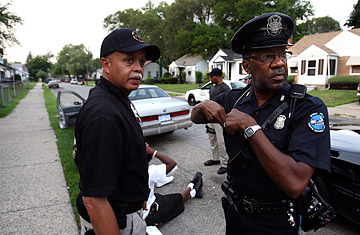
Detroit chief of police Warren Evans, left, talks with officer George Moore on patrol in Detroit
When Warren Evans took over as Detroit's police chief last summer, he came on strong and got results. Evans deployed a Special Response Team (SRT), using military-style tactics and weapons to handle ordinary police actions like traffic stops. At a time of cutbacks to the police force, he seemed to be effectively doing more with less. Last month, Evans called a press conference to tout his progress. The average police response time to priority 911 calls had shortened nearly 28%, to 24 minutes, from the time taken a year earlier. Recorded homicides declined 25%.
Now Evans' paramilitary approach to police work is under attack. The criticism comes in the aftermath of a new wave of violence that included the death of a 7-year-old girl who was accidentally shot by police during a raid of a home. Earlier this month, five Detroit police officers were shot, one fatally, while investigating a reported break-in at an abandoned building. When Evans appeared on a local TV program Sunday, he wearily summed up his experience so far in one of America's toughest jobs: "It's cloudy some days. And some days, it rains all day. It's been doing a lot of raining lately."
So far, Evans has the support of Detroit Mayor Dave Bing. But the mayor also told the Detroit News this week that Evans is "aggressive," and said a deputy mayor will be "reining him in." Changes may come after state and federal investigations of the May 16 killing of the 7-year-old girl, Aiyana Stanley-Jones.
A short, relatively trim man in his early 60s, Evans faces a unique challenge in taming Detroit's violent crime, one of the biggest barriers to the city's comeback aspirations. He commands a force of barely 3,000 officers — down from about 4,000 just a few years ago — who patrol an often sparsely populated territory of nearly 140 square miles. (Manhattan, San Francisco and Boston could fit within Detroit's borders, with room to spare). Detroit's police are spread so thin that some citizens have lost confidence officers will respond swiftly to 911 calls. That's why some of the city's remaining middle-class neighborhoods have hired private security patrols.
Evans came to the police chief's job with an impressive pedigree. Born into one of Detroit's prominent black families, he seemed destined to be in charge of something. In the early 1900s, just as Southern blacks began moving en masse to take part in Detroit's auto boom, Evans' grandfather helped found one of the city's first hospitals to allow black doctors to practice. Another relative was among the first sheriff's deputies of Wayne County, Mich., which includes Detroit. Civil Rights–era figures like Malcolm X and Stokely Carmichael were regulars at the Evans family home, where a biweekly newspaper, the Illustrated News, was printed in the basement.
